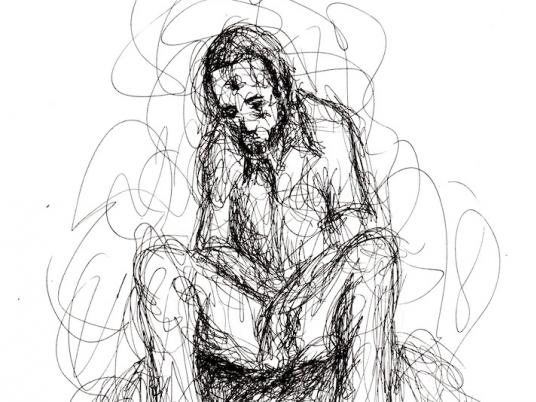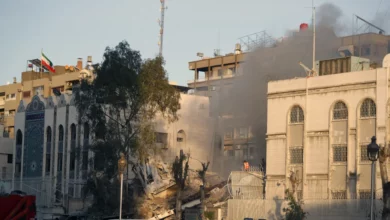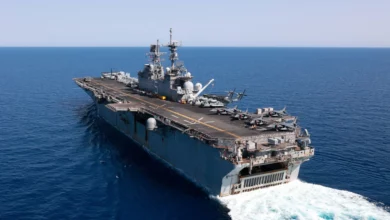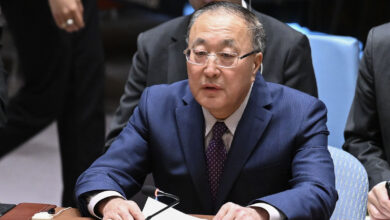It takes all sorts to make a revolution, even just to win a war. The four fighters of the Free Syrian Army profiled here each have their own stories, and their own hopes for the future. They worry, variously, about their children, about the organization and funding of their fledgling militia, about internal divisions within their ranks. Injury and death surrounds them everyday, and each has his own reasons to continue fighting.
Abu Bakr: The shepherd of Aleppo
Abu Bakr is a fighter in Lewaa al-Haq Battalion and was injured in the battle of Azaz, a village in the Aleppo countryside that is now called the “tanks cemetery.” There, Free Syrian Army fighters burned down the regime’s tanks and left them sitting in the middle of the village as a reminder of their victory.
Before joining the revolution, Abu Bakr worked in construction in Libya, where he began attending Syrian opposition meetings to find ways to support the uprising.
“But I felt it was only talk," he says. "So I found a group of Libyan mujahideen who wanted to go to Syria and needed a guide. I told myself foreigners want to go and save my country — how can I stay behind?”
Abu Bakr reached Syria through the Lebanese northern city of Tripoli, from which he joined the Farouq Brigade in Homs. He was assigned primarily to secure the roads through which arms were smuggled from Tripoli to Homs,
but when he disagreed with others in the brigade, he left and headed back to the Aleppo countryside, where he saw his parents for the first time in four years.
He describes what it was like when the forces of Syrian President Bashar al-Assad’s regime searched for him.
“When Bashar’s men came looking for me, my folks hid me in a room. The days were getting longer, so I decided to leave. I dressed up as a shepherd and moved to Marea, where I joined the battalion,” he says.
While taking up this fight fulfills him, Abu Bakr fears the future.
“We are all now united on ousting Bashar, but God be with us the moment we oust him and are faced with our divisions,” he says.
Like many others affected by the conflict, death has become normalized for Abu Bakr.
“In your country, when you receive the news of someone’s death, you would be shocked,” he says. “Here and now, when you receive the news of someone’s death, you just carry on. Death is everywhere.”
Abu Uday: Leave and never come back
Abu Uday is a volunteer in Lewaa al-Haq. Three months ago, he was a soldier serving in an officers’ club in Aleppo, but he decided to defect with the intention of joining the Free Syrian Army in his hometown, Deraa, the town seen as the birthplace of the uprising.
He took three days leave along with two colleagues, only to never come back. On their way out of Aleppo, they were stopped by a checkpoint where armed men pretended they worked with the FSA.
“They captured us, then called our parents and asked for 5,000 liras ransom, which they later brought down to 3,000. It turned out they weren’t FSA,” says Abu Uday.
One early morning, the doorman guarding them was asleep, and the window of the bathroom was wide open. So they fled to Marea.
“When we reached the village, we were told that the first checkpoint is a FSA one. So we turned ourselves in,” he says. “They called our parents and told them we were okay. They asked those parents who were going to pay the ransom to stay home. They turned out to be FSA for real.”
Abu Uday, who hasn’t seen his 18-month-old child in months, decided to stay behind, in Marea.
“I defected after what we saw in Deraa. Assad’s men would lay people on the ground and run over them with armed military vehicles,” he says.
In the mess of tattoos all over his arms, a heart can be spotted, with an initial. When asked who the initial is for, he blushes and smiles, before explaining easy tattoo-making techniques.
Among many things, he has been cooking for his injured co-fighters, who lament the fact that he has been making them pasta every day.
Mohamed Najjar: The problem is nightmares
Mohamed Najjar is an arms manufacturer and fighter in Lewaa al-Haq in Aleppo. There is no hint that this macho-looking, big man often carrying around at least three guns is only 24.
Before the revolution, he served in the army for two and a half years, a time that gave him both thrust and expertise for the ensuing rebellion. He bitterly recalls how soldiers were banned from performing prayers while being in conscription. He started off by peacefully protesting in the countryside of Aleppo.
“I never thought the revolution would take that path down,” he says.
Earlier during the revolution, he partook in the Free Syrian Army battles, focusing on capturing soldiers and officers from the adversaries’ front. Most of those he captured would be exchanged with FSA soldiers in custody.
Then he put to use his previous military training, joining a blacksmith workshop to manufacture guns for the fighters. He would separate the bodies of the weapons from the ammunition to avoid explosions.
“I prefer when I was on the ground fighting directly, not because I love spilling blood, but because I want to see an end to all of this,” he says.
In the current stride of the revolution, Najjar is interested in preserving the victories of the FSA in Aleppo and elsewhere by establishing security committees that maintain internal security and protect liberated zones from potential raids.
“This requires a lot of training. These committees need to start learning how to deal with civilians since it’s not just about military actions now,” he says.
As he gets ready to step out of Syria for a brief visit to his family, which is taking refuge in Turkey, he laments about coming back to more losses.
But, with a mix of determination and submission, he acknowledges there’s no going back.
“There can’t be a return to the Syria of yesterday,” he says. “That means we would all be massacred.”
Meanwhile, he worries about nightmares.
“When you leave the battlefield for a break, you start having nightmares about it,” he says. “It’s just easier to be in the middle of it.”
Abu Mohamed: All against Assad
Abu Mohamed is a commander in the Tawheed Brigade. He just returned from the frontline in Aleppo, where he took part in the critical Hanano Battle, from which the Free Syrian Army emerged victorious.
Before joining the FSA he was a lieutenant in the Syrian army. Three years ago, he defected and applied for asylum in Belgium. He attributes his defection to sectarian discrimination within the army, in which Sunni officers would consistently be marginalized.
When the Free Syrian Army was formed, he joined in Damascus, then in Homs, with the Sahhaba Brigade. Then he moved with the revolution to Aleppo, where he joined the Tawheed Brigade — one of the largest in the FSA today.
The brigade, he says, includes Arabs, Turks and Kurds.
“I was attracted by this diversity, and this made me feel comfortable about joining. You feel that these different people share their love for Syria and its revolution,” he says, expounding on how, with time, the brigade developed and became professionalized.
For him, the main challenge in Aleppo is with the Shabiha, President Bashar al-Assad’s informal militia, which he says numbered 90,000 in the city at one point. A more structural challenge pertains to the divided support of the FSA by different regimes outside of Syria.
“The Saudis are supporting Ahrar al-Sham. The secularists are supporting secular fighters. The right military action is one in which support is unified and coordinated,” Abu Mohamed says.
He adds that there is no will to support Syria seriously, and the proof is the fact that all anti-aircraft weaponry is kept away.
International donors always use the Nusra Brigade, which autonomously claimed ties with Al-Qaeda, as a pretext to withhold full support, he says, “while they are only part of the FSA and not the whole army.”
“There is an international agreement to witness Syria drown,” he laments, while insisting that victory is coming — one day.
“We freed Aleppo with 240 gunshots and a bunch of guns,” he says.
For him, there could be no alternative path to the militarization of the revolution.
“I was in the army, and I am well aware of the regime’s mentality. This revolution could have never been peaceful. The militarization of the revolution is a normal act of self-defense, at the very least,” he says.
He foresees staying in the army after Assad is removed from power, warning that an army which evolves out of the FSA will only collaborate with politicians who unconditionally supported the revolution, on the ground.
This piece was originally published in Egypt Independent's weekly print edition along with Inside Aleppo: A glimpse of those fighting for Assad's fall.







